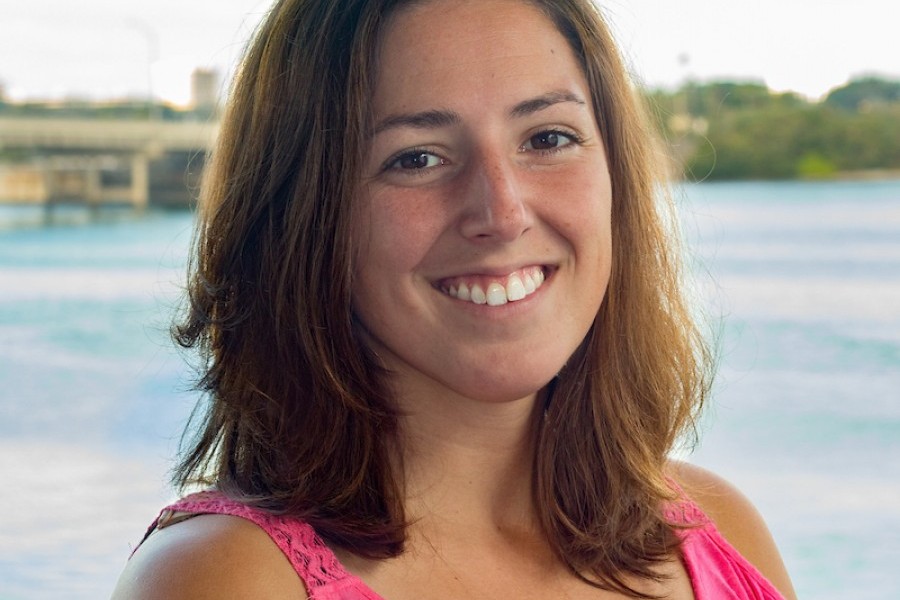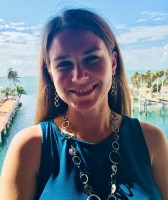Mote welcomes two new scientists to Florida Keys campus

Dr. Heather Page is developing a research program to study ocean acidification effects on three key "players" of coral reefs.
Mote Marine Laboratory is delighted to welcome new Postdoctoral Research Fellow Dr. Heather Page and Staff Biologist Dr. Abigail Clark to its Elizabeth Moore International Center for Coral Reef Research & Restoration (IC2R3) on Summerland Key, Florida.
Dr. Heather Page, hired in January, joins Mote’s growing team of next-generation scientists. Her presence demonstrates progress toward a key goal in Mote’s 2020 Vision & Strategic Plan: to attract and nurture the next generation of the best and brightest minds in marine science through the Mote Postdoctoral Research Fellowship program. Currently, Page is developing a research program to study ocean acidification (OA) effects on three key “players” of coral reefs in Florida and throughout the Caribbean – corals, seaweeds and sponges. Specifically, Page is interested in understanding how these groups of species interact and how their interactions may change with projected OA in the future. OA is a human-driven ocean chemistry change — reduction of pH (making the water more acidic) — due to increased carbon dioxide absorbed by the seawater from the atmosphere. Lower pH levels can weaken and may even dissolve calcium carbonate-based structures such as coral skeletons and mollusk shells.
“The impact of the overwhelming pressure on our reefs, partly because of human-induced environmental changes, is of critical interest to me,” Page said. “I’m focused on understanding species interactions between individual corals and various seaweeds and sponges under current conditions and predicted OA conditions.”
Page will study these interactions using tanks that are part of Mote’s Alfred Goldstein Institution of Climate Change Studies at IC2R3 over the next few months.
Beyond coral reefs, Page is also interested in the response of other coastal organisms and ecosystems to OA. Her dissertation research investigated how biological processes of coral reef communities influence seawater CO2 chemistry. This research helps describe how some communities of living things may reduce the severity of human-driven OA, whereas other communities may exacerbate it.
Page is enthusiastic about marine science education, outreach and communication. While earning her doctorate, she taught for various education programs for high school and undergraduate classes. She also served as a coordinator and volunteer for the Scripps Community Outreach in Public Education program and currently acts as a representative for the International Society of Reef Studies Education Committee. “Sharing my knowledge bank with budding scientists and ocean enthusiasts is a passion of mine,” Page said. “As I settle into my research here at IC2R3, I hope to become involved with Mote’s existing outreach programs and even develop new learning programs in the Florida Keys.”
Page earned her Bachelor of Science in Marine Biology & Environmental Science, with honors, from the University of North Carolina, Wilmington in 2011. She received her master’s degree and doctorate in Oceanography from the Scripps Institution of Oceanography and the University of California, San Diego, in 2014 and 2017, respectively.
Dr. Abigail Clark joined Mote in early 2018 as a Staff Biologist at IC2R3. She is tasked with set-up and management of the molecular biology and microbiology laboratories at this new state-of-the-art research facility, in order to facilitate and expand coral reef research by Mote scientists, visiting scientists and students. IC2R3 serves hundreds of scientists and students from more than 60 different institutions worldwide who are working to understand, restore and protect coral reefs. For such visitors, Clark can provide assistance with equipment training and use, processing data, preparing samples, maintaining experiments, and overall research organization, set-up and breakdown.
IC2R3 is a LEED (Leadership in Energy and Environmental Design) Gold facility, housing the Alfred Goldstein Institute for Climate Change Studies. The facility offers scientists access to new seawater systems, raceways and experimental tanks for studying multiple reef species facing climate change impacts such as rising ocean temperatures and OA; molecular equipment to process and prepare samples for next generation sequencing and genomic analyses — for example, to find the best genetic strains of corals for reef restoration; microbial supplies for studying microscopic life forms that can help or harm coral reefs; a carbonate chemistry lab for ocean acidification research; and more.
“The ability to share our innovative technology and techniques with various talented scientists and students from around the world continues to set Mote apart as a leader and collaborative partner in coral reef research and other marine science, conservation and restoration efforts,” Clark said. “Our state-of-the-art laboratories bring hundreds of like-minded marine science stewards into our facility and create an active learning environment that directly benefits our oceans.”
Clark is originally from New Hampshire and received her Bachelor of Science in Biology from Emmanuel College in Boston. During her senior year, she interned at the New England Aquarium, where she became inspired by lobster research. While subsequently receiving her master’s degree in Zoology from the University of New Hampshire, she studied the efficacy of ventless and standard, vented lobster traps in estimating the abundance of American lobster populations off New Hampshire. By monitoring lobster behavior in and around traps, she was able to better determine factors leading to trap saturation (a plateau in catch over time). This work has implications for enhancing management of the American lobster fishery.
Her dissertation research focused on Caribbean spiny lobster. Her investigation of lobster disease ecology, specifically of the lethal virus Panulirus argus Virus 1 (PaV1), earned her a doctorate in Fisheries and Aquatic Sciences from the University of Florida. Clark studied the relationship between a lobster’s size and the viral count in its body, viability of PaV1 in the water column and the spatial epidemiology of PaV1 across the Florida Keys to identify factors that influence its prevalence — for instance, habitat dominated by seagrass vs. hard bottom.
In addition to serving the hundreds of visiting scientists at Mote’s Summerland Key campus, Clark hopes to continue to pursuing grants applying her knowledge of marine diseases.
